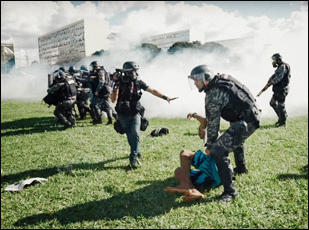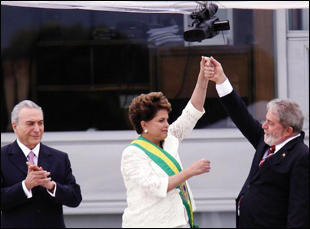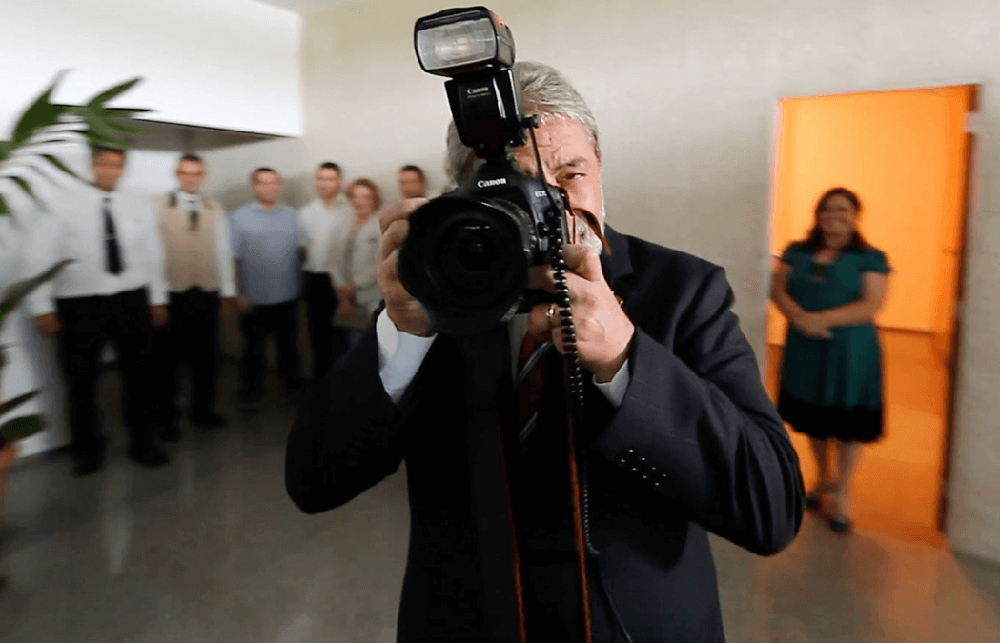“I keep promising myself I never want to narrate a film again because it’s so much work,” Petra Costa tells me, having just lent her voice to her second documentary “The Edge of Democracy.”
“But you do it so well,” insists Joanna Natasegara, one of the film’s producers, during a recent press day for the film in Los Angeles.
“It’s exhausting,” continues Costa. “not only filming and editing, but writing and rewriting and recording and having to act and be your own director, and [then] the infinite possibilities the narration can bring to the film – it creates a wonderful problem. But it was fascinating, [because] for me it was the most pleasurable part where I had the ability to make sense of what was happening.”
It’s difficult to imagine a more inexplicable situation than when “The Edge of Democracy” begins, with chaos unfolding in the streets of Costa’s native Brazil in April 2018 when former President Luiz Inácio Lula da Silva is being asked to turn himself into authorities over charges of corruption. (Recent reports outline how Sergio Moro, the judge in the case and now Brazil’s Justice Minister, kept in contact with prosecutors over how to handle their media strategy to convict Lula and derail the popular politician’s plans to run for president once more.)
Over his seven-year tenure, Lula had brought equity to the country with innovative initiatives to end hunger and offer financial assistance to families tied to educating their young, programs that were expected to continue when he left office and the country elected his chief of staff Dilma Rousseff to take his place. However, lifting up the country’s poor would raise the ire of the rich, leading to a campaign to discredit Rousseff, using a specious money laundering investigation that would ultimately end with her impeachment, and an opening for far right nationalists to stoke fears about wealth redistribution that fueled the rise of the country’s current president Jair Bolsonaro.
 With passions drowning out nuance and intentional obfuscation on the part of bad actors in Brazil’s bureaucracy, Costa offers clarity amidst the cacophony with her calm, convincing and thorough analysis that presents the current political moment as the swing of a historical pendulum that she never thought would return after the country embraced democracy following a period of military dictatorship that spanned from 1964 to 1985. However, her voice isn’t only piercing in how sharply each word and idea is articulated, but in the heartache that personalizes the experience, finding tragic dimension not only in how the country has been divided over a way forward, but how within her own family, there’s been great unspoken conflict between generations as her parents had to go into hiding during the coup while her grandparents profited from government construction work. Costa found it difficult to say these things herself.
With passions drowning out nuance and intentional obfuscation on the part of bad actors in Brazil’s bureaucracy, Costa offers clarity amidst the cacophony with her calm, convincing and thorough analysis that presents the current political moment as the swing of a historical pendulum that she never thought would return after the country embraced democracy following a period of military dictatorship that spanned from 1964 to 1985. However, her voice isn’t only piercing in how sharply each word and idea is articulated, but in the heartache that personalizes the experience, finding tragic dimension not only in how the country has been divided over a way forward, but how within her own family, there’s been great unspoken conflict between generations as her parents had to go into hiding during the coup while her grandparents profited from government construction work. Costa found it difficult to say these things herself.
“I didn’t want to co-opt a very universal story and make it about me only,” says Costa, who had reservations about the voiceover. “I also did not want to just have too many didactic explanations that would make the film boring for Brazilians, so finding that balance was the hardest exercise we were doing until the last minute, working with the voiceover back and forth through Skype.”
“It’s my favorite kind of relationship with a director because there’s a part of being a producer where you’re holding space for a director and it’s brave going into that personal space. ” adds Natasegara. “Petra’s work on this film when she takes history and then her personal emotion, married with this quite transparent look at her own family and that’s quite a scary place for anybody to go and she shares that very generously with the audience.”
In the case of Costa’s previous documentary “Elena,” the conceit seemed unavoidable, given how personal a story she was telling in recounting her sister following her dream of becoming an actress, leaving Brazil during the coup – and by extension, Petra when she was just a child – making the family’s reunion years later when the filmmaker and their mother decamped to New York to live with her a culture shock all around. But in making a sprawling political thriller, Costa may initially have felt less authoritative when attempting to wrap her arms around the plot to bring down Rousseff and Lula and the dismantling of the democratic state, collecting copious materials ranging from the footage she herself filmed in the midst of protests in the streets and even inside the presidential mansion as it sat empty to the wiretapped conversations outlining a perversion of the justice system.
She had enlisted the help of Natasegara, the fearless producer behind such films as “Virunga” and “White Helmets,” after being introduced by by Doc Society (the organization formerly known as Brit Doc) who thought her global perspective and prowess would be an asset to Costa, and although she worried that a work of investigative journalism might be less credible if she made the narration too personal, it was always a necessity in order to tie a story of such disparate pieces together. Now, if any uncertainty can be detected in her voice, it only adds to the film’s soulfulness as she perfectly captures the feeling of a world on shaky terrain.
“There were some of the people we were working with thought the film should be more vérité style and we were debating that until we went to a lab called Doc Incubator,” says Costa. “For that lab, we tried putting in the voiceover for the first time and seeing how it felt. It was funny because it was a two-hour cut and the parts that people connected to were the parts where the narration was because there’s where they felt they could come in as international audiences. The parts that were vérité style, which for Brazilians could be quite attractive, were just completely confusing for them, so that became clear that was the right path to follow.”
By releasing the film on Netflix, Costa could record the narration herself in both English and her native Portuguese, among the other languages it will be translated into for its release in over 190 countries, without losing any of its inherent emotional resonance. (In Brazil alone, the streaming service provides an democratic benefit in bypassing channels that could be subject to government oversight and still be available to the public legally.) But the use of voiceover created other opportunities for Costa, who took inspiration from how to tackle covering the crisis in Brazil by looking to Patricio Guzman’s “Battle of Chile.”
“How he manages to tell a story that is about a country, not just about a political class, [where] he’s following the streets, he’s following what’s happening in the congress, he’s following what’s happening in the presidential palace — that was my guideline,” says Costa. “Every moment, we wanted to be in these three spheres, and I knew what would be most revealing about the story was time. In the beginning of 2016, as in most political crises, everything was confusing, but history has had a tendency to repeat itself in Brazil, which is quite haunting. More presidents fell than finished their mandates in Brazil. There’s a history of the elites making pacts so that everything can stay the same, and bearing witness to time really revealed the motivations behind what was happening.”
 While Guzman was famously gifted film stock from the legendary French filmmaker Chris Marker to start making “Battle of Chile,” the “La Jetée” director contributed spiritually to “The Edge of Democracy” as well where Costa is able to make time stand still using only her voice, deconstructing body language as Marker often would, in one of the film’s most arresting moments as she observes the inauguration of Dilma Rousseff in 2011 in great detail and realizing the distance between her and then-vice president Michel Temer was one clue among many that he would be complicit in prematurely ending her presidency so he could succeed her.
While Guzman was famously gifted film stock from the legendary French filmmaker Chris Marker to start making “Battle of Chile,” the “La Jetée” director contributed spiritually to “The Edge of Democracy” as well where Costa is able to make time stand still using only her voice, deconstructing body language as Marker often would, in one of the film’s most arresting moments as she observes the inauguration of Dilma Rousseff in 2011 in great detail and realizing the distance between her and then-vice president Michel Temer was one clue among many that he would be complicit in prematurely ending her presidency so he could succeed her.
“I worked with a great journalist and writer named Carol Pires and we wrote that part together,” says Costa. “I remember it was really in the early days, I showed her some films by Chris Marker, which I really love — how [he] manages to look at a moment and read what was actually happening, and it was amazing how much was revealed just in the body movements of Temer and Dilma at the inauguration.”
It’s the kind of insight that turns the arcane political machinations that has destabilized so many lives into something understandably human, if still inconceivable, and as is often the case, it’s by personalizing the precarious situation in Brazil that Costa is able to tell a story that reverberates around the world.
“It’s probably one of the most important global stories of the last decade and it’s quite underreported, probably because the international audiences I think particularly found it very, very hard to follow and very hard to understand what happened and hopefully this changes that for a global audience,” says Natasegara. “What we really hope is despite Petra’s opinion being quite clear in the film is that the film actually can be agreed upon as a series of facts by both sides and we’re really looking to open up that dialogue on both sides of the house – both in Brazil and in other countries to say isn’t democracy the thing that we should joining together to preserve? Isn’t it worth something more than our divisions, which seem to be getting more and more polarized?”
So far, both Natasegara and Costa have been heartened by the responses they’ve received while the film has played to great acclaim on the festival circuit since debuting earlier this year at the Sundance Film Festival and has played everywhere from CPH:DOX in Copenhagen to Hot Docs in Toronto.
“It’s gratifying to see that the story resonates with people all over the world, and I think we are in a time of crisis, but crisis can lend itself to epiphany and a greater evolution of human kind in some way,” says Costa. “So I hope this film can help in that reflection of how we can come out of this democratic crisis we’re all in.”
“The Edge of Democracy” is now streaming on Netflix.




